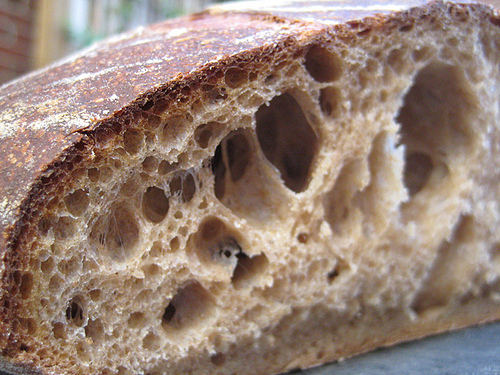5 When the disciples reached the other side, they had forgotten to bring any bread. 6 Jesus said to them, “Watch and beware of the leaven of the Pharisees and Sadducees.” 7 And they began discussing it among themselves, saying, “We brought no bread.” 8 But Jesus, aware of this, said, “O you of little faith, why are you discussing among yourselves the fact that you have no bread? 9 Do you not yet perceive? Do you not remember the five loaves for the five thousand, and how many baskets you gathered? 10 Or the seven loaves for the four thousand, and how many baskets you gathered? 11 How is it that you fail to understand that I did not speak about bread? Beware of the leaven of the Pharisees and Sadducees.” 12 Then they understood that he did not tell them to beware of the leaven of bread, but of the teaching of the Pharisees and Sadducees.
Matthew 16:5-12
I often marvel at how I can talk to people about the grace which is inherent in the gospel in the clearest of terms for many many months, and it turns out that while they were nodding their heads they just ended up disagreeing with the whole thing. I even marvel about this within myself – I am constantly finding myself struggling with Romans 7:15-8:1 ƒ since in my mind I have gone back to measuring my progress and keeping score and making people pay for their little injustices. This idea of “leaven” is very helpful in understanding this.
A 2 lb loaf of bread requires 1.5 teaspoons of yeast to aerate it with the bubbles that harden into what we are familiar with as normal leavened bread. It doesn’t take much yeast, and of that, some of the substance in the yeast is filler. The point is, whatever is the main thing that makes the Pharisees what they are, it is something that takes just a tiny little bit to make another person just like them. Yeast is an organism that can grow to fill up and take over whatever it is introduced into. Like a virulent virus, once introduced it can completely transform the nature of the host.
We see many instances in scripture where this principle of a little touch of something defines and takes over the whole nature. In Haggai 2:12-14 we see that a holy garment becomes unclean by a single touch of the unholy. One transgression of the law means the whole law has been transgressed (James 2:10-11). On the other hand, one touch from Jesus cleanses the leper (Mark 1:40-41). Jesus cleanses only the feet, and the whole man is cleansed (John 13:9-10). A little of the leaven of the Pharisees makes the whole unclean, while a little of the leaven of Christ makes the whole clean.
So, like leaven and flour, you cannot maintain a little bit of law with your grace. We are no longer under the law but under grace (Romans 6:14). A bit of law nullifies grace (Galatians 2:21). Like leaven, the law overtakes the whole loaf. If you mostly believe in the one-way grace and acceptance of God, but you still maintain that somehow there remains the remote possibility that our poor performance can persuade Him to reject us, you have the leaven of the Pharisees. It will fill the whole loaf, because at its root, you have rejected faith in the Gospel. The goal of the gospel is not for you to live up to the expectations of the pharisaical people around you. The goal of the Gospel is to save you to the uttermost. Once you realize that the law is no longer your God, and that the law has never been the Lord over God, you can enter into the freedom of living from the standpoint of one who is beloved instead of from the standpoint of one who is rejected. The law becomes your servant, and you can choose virtue from your freedom instead of from fear and threat. As long as one tiny little sliver of belief in the threat of the law remains, you stand condemned in the law because that is what the law does. It measures and condemns. If you believe in Christ, you believe that the entire threat of the law has been visited upon Christ and fulfilled, and you are cleansed from all of the leaven of the Pharisees.


Jim,
I love this, but I get discouraged about my progress/heart. I don’t feel like a new creation a lot of the time. I still desire the old things and don’t see pleasure or value in the new/obedience. I think what you are saying, is that to the degree that I feel threat from the law, I will never take pleasure in God’s way because it is a “have to” rather than a “get to”. Am I reading you correctly? It’s hard to let go and trust that the Gospel will indeed transform our desires, as I think many of think that becoming a Christian means we immediately and always have right desires.
By the way, praise God on the new job!
Thanks!!!! I love the job. It’s nice to think some income will be coming in as well.